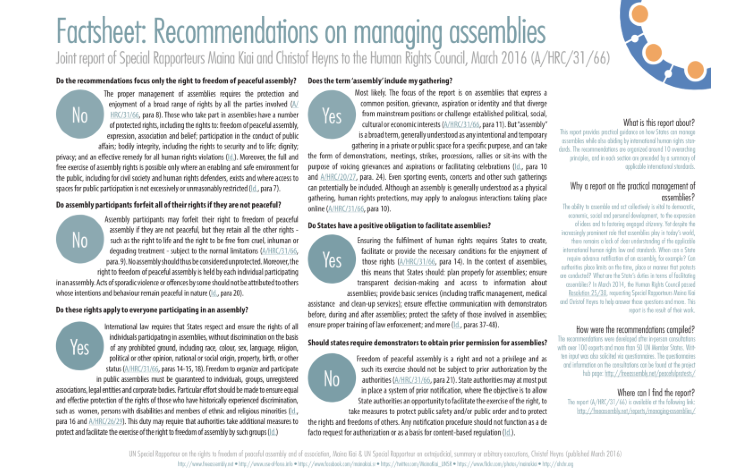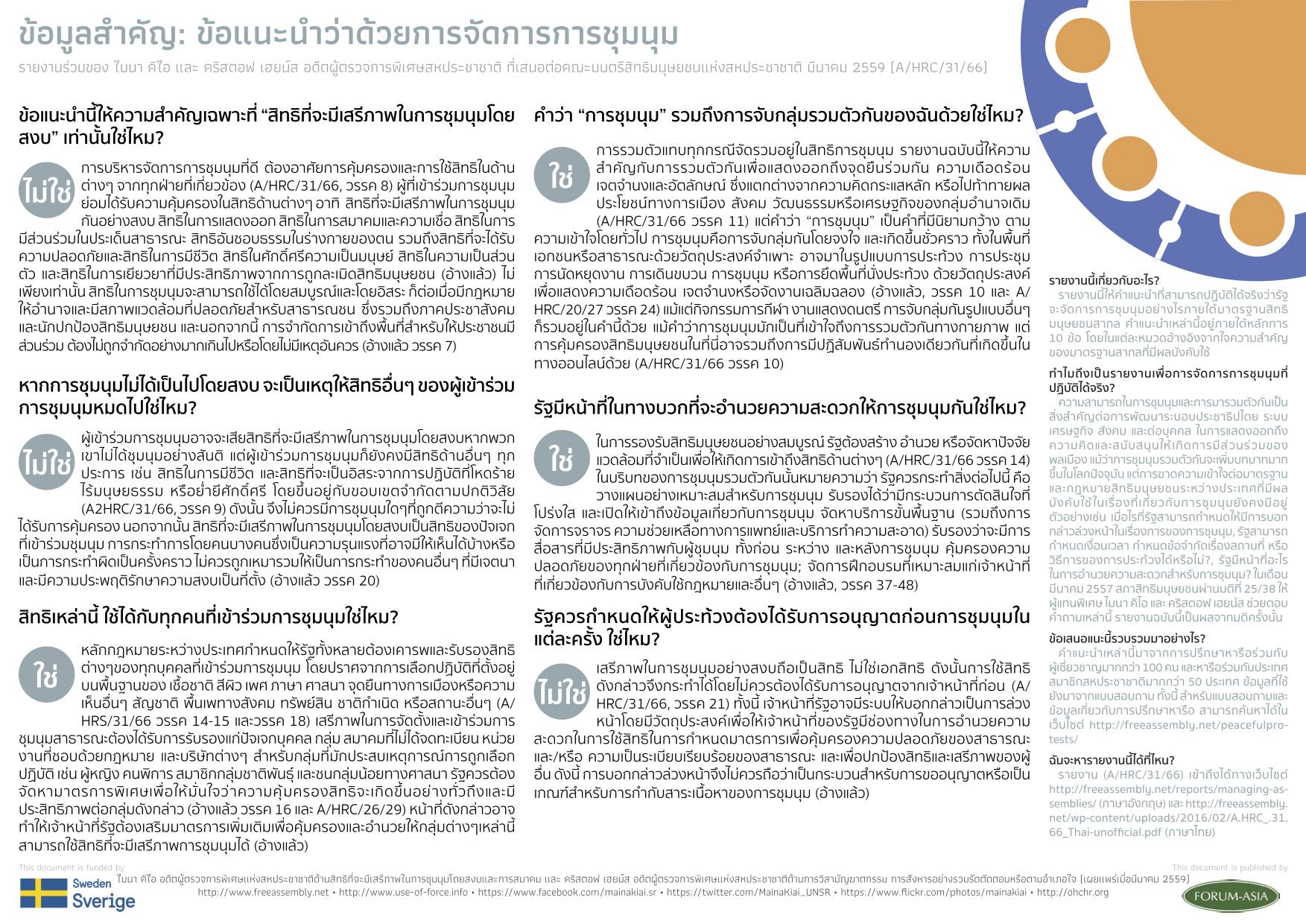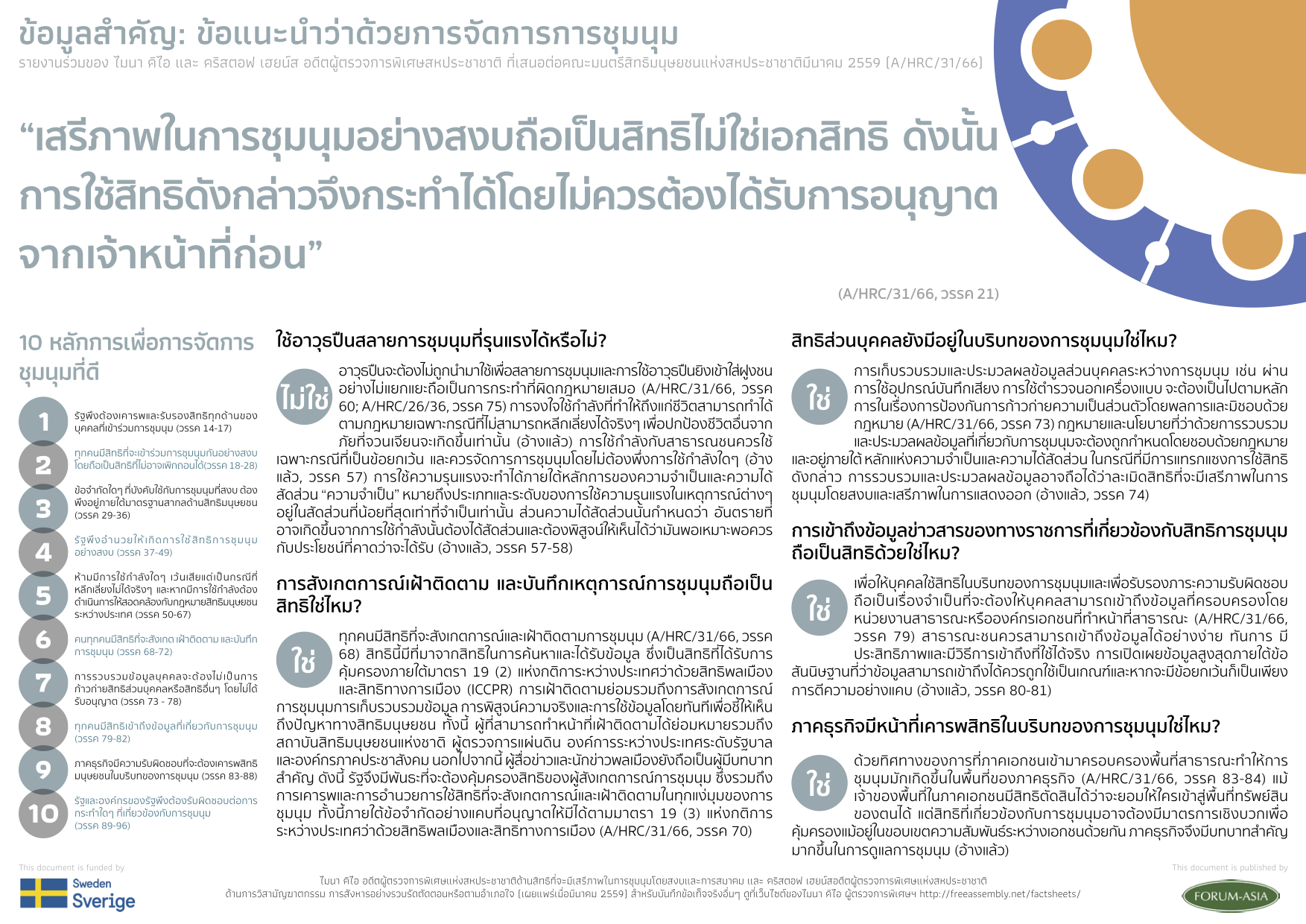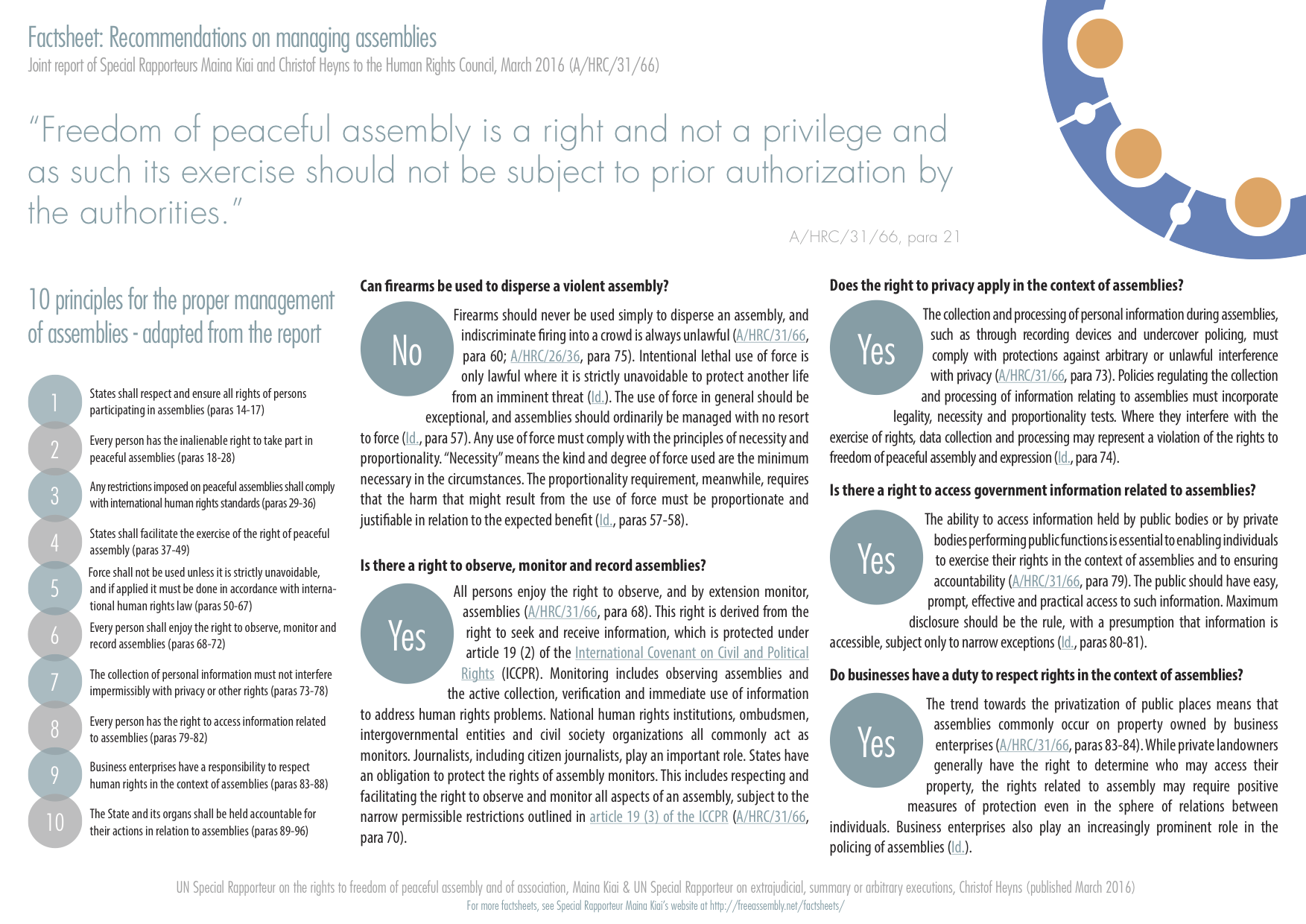เอกสารว่าด้วยข้อแนะนำในการจัดการการชุมนุมของอดีตผู้รายงานพิเศษแห่งสหประชาชาติ
ในปี 2016 สองผู้แทนรายงานพิเศษแห่งสหประชาชาติในขณะนั้น ไมนา คิไอ (Maina Kiai) อดีตผู้แทนรายงานพิเศษด้านเสรีภาพในการชุมนุมโดยสงบและการสมาคม และ คริสตอฟ เฮยน์ส (Christof Heyns) อดีตผู้แทนรายงานพิเศษด้านการสังหารนอกกระบวนการกฎหมาย การสังหารอย่างรวบรัด หรือ โดยพลการ ได้เผยแพร่เอกสารว่าด้วยข้อแนะนำในการจัดการการชุมนุม โดยเอกสารดังกล่าวได้ให้ข้อมูลสำคัญที่เกี่ยวข้องกับสิทธิของปัจเจกบุคคล และหน้าที่ของรัฐในการปกป้องคุ้มครองการแสดงออกซึ่งสิทธิที่จะชุมนุมโดยสงบ
หลายปีนับจากการเผยแพร่เอกสารดังกล่าว ทั่วโลกต่างได้เห็นการชุมนุมและการประท้วงที่เกิดขึ้นในที่ต่างๆ ไม่ว่าจะเป็นในอินเดีย อินโดนีเซีย ฮ่องกง เลบานอน ชิลี ฝรั่งเศส และ สหราชอาณาจักร การชุมนุมประท้วงเหล่านี้ต่างนำมาซึ่งคำถามที่สำคัญต่างๆไม่ว่าจะเป็น อะไรคือสิทธิและหน้าที่ของเราในฐานะพลเมือง? รัฐควรมีมาตรการอย่างไร? ความรับผิดชอบจะตกเป็นของฝ่ายใดเมื่อการประท้วงเริ่มนำไปสู่ความรุนแรง? คำถามต่างๆเหล่านี้จึงเกี่ยวข้องอย่างยิ่งต่อประเทศไทยภายใต้สภาวะที่การชุมนุมโดยสงบหลายๆครั้งกลับต้องเผชิญข้อจำกัดโดยพลการผ่านบทกฎหมายต่างๆ ซึ่งทำให้นักปกป้องสิทธิมนุษยชนและภาคประชาสังคมทั้งหมดต่างประสบความยากลำบากในการทำให้เสียงของพวกเขาได้รับการรับฟัง
ฟอรั่ม-เอเชีย (FORUM-ASIA) ได้แปลเอกสารดังกล่าวเป็นภาษาไทยเพื่อให้ภาคประชาสังคมไทยทุกภาคส่วนสามารถได้ประโยชน์จากข้อมูลในเอกสารนี้ โดยเฉพาะอย่างยิ่งภาคประชาสังคมรากหญ้าที่ต้องเจอความยากลำบากในการเชื่อมโยงขบวนการของตนเข้ากับชุมชนสิทธิมนุษยชนในระดับสากล แต่ขณะเดียวกันก็เป็นภาคประชาสังคมรากหญ้านี้เองที่ต้องประสบพบเจอข้อจำกัดต่างๆมากที่สุดในการใช้เสรีภาพขั้นพื้นฐานของตัวเอง ฟอรั่ม-เอเชียหวังว่าการแปลเอกสารครั้งนี้จะเป็นอีกก้าวหนึ่งที่ช่วยให้เกิดการยอมรับมากขึ้นของสิทธิมนุษยชน โดยเฉพาะอย่างยิ่งการใช้สิทธิในการชุมนุมโดยสงบ
ต้นฉบับของเอกสารดังกล่าวสามารถเข้าถึงได้ผ่าน:
http://freeassembly.net/wp-content/uploads/2016/03/Protest-recommendations-factsheet-final.pdf
Factsheet: Recommendations on managing assemblies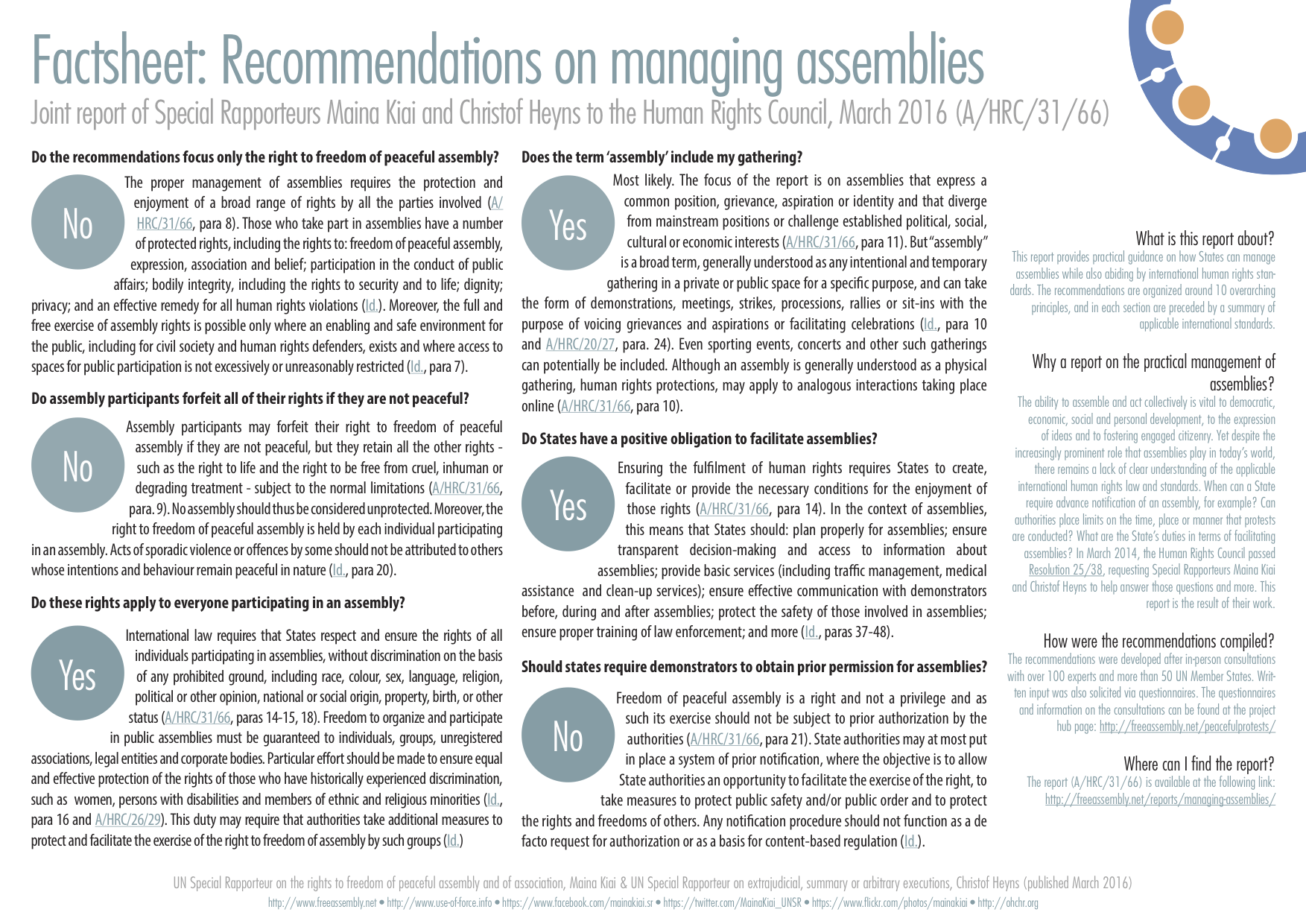
In 2016, Maina Kiai who was then UN Special Rapporteur for Freedom of Peaceful Assembly and Association and Christof Heyns, then UN Special Rapporteur for extrajudicial, summary or arbitrary executions, released a fact-sheet on the management of assemblies. The fact-sheet provides critical information on the rights of individuals, and the obligations of the State in ensuring the protection of the right to peaceful assembly.
Since its release, assemblies and protests have been seen all over the world – from India to Indonesia, Hong Kong, Lebanon, Chile, France, and the United Kingdom. All of these protests raise critical questions. What are our rights and responsibilities? How should States react? Or who is responsible when protests turn violent?
In Thailand, where peaceful assemblies face arbitrary restrictions through a myriad of laws, human rights defenders and all of civil society continue to struggle to be heard.
FORUM-ASIA has translated the fact-sheet to Thai to ensure that all of Thai civil society can benefit from it. There is much to be learned and heard from those at the grassroots level, who struggle to connect with the international human rights community, but are often the most affected by the restrictions on their fundamental freedoms. FORUM-ASIA hopes that this translation will be a step towards the realisation of those rights, especially the right to peaceful assembly.
The original link to the fact-sheet can be accessible via:
http://freeassembly.net/wp-content/uploads/2016/03/Protest-recommendations-factsheet-final.pdf

